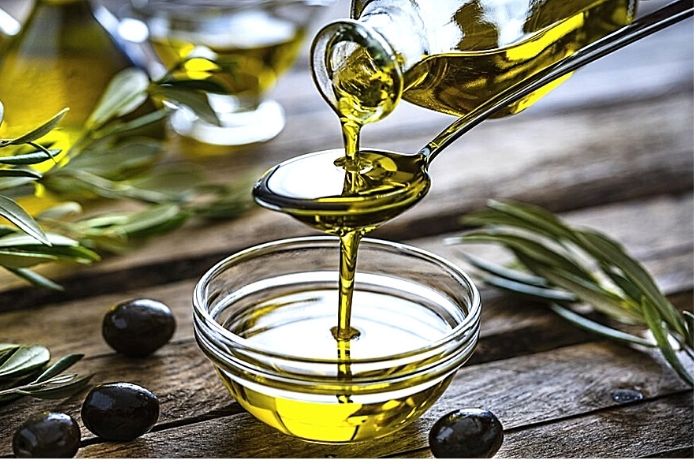The best alternative to butter: vegetable fats with valuable ingredients. What are the properties of olive oil, linseed oil, rapeseed oil, sunflower oil, corn oil, wheat germ oil, and soybean oil
Almost 190 million liters of cooking oil were consumed in private households last year. Around 55 percent of this is made up of rapeseed and olive oils, which are considered healthy. The advantages of plant-based butter alternatives: They absorb fat-soluble vitamins and provide the body with valuable ingredients.
The old demand for a diet as low in fat as possible can hardly be met today. “The decisive factor is the fat quality,”
The fatty acids are responsible for the good or bad properties (see also overview). Fat is made up of a glycerol molecule, which you can think of like the letter E. A long, chain-shaped fatty acid hangs from each of the three E-arms.
Fat For Good Blood Values
If this has one or more chemical double bonds, it is a monounsaturated fatty acid (color code see graphics below) or a polyunsaturated one. Both have a positive effect on the cardiovascular system and fat metabolism in nutrition. They are mainly found in fish and nuts as well as in most vegetable oils.
Polyunsaturated omega-3 fatty acids are particularly beneficial for health. They regulate blood lipid levels, improve the flow properties of the blood, and have an anti-inflammatory effect.
“On the other hand, omega-6 fatty acids , which are also polyunsaturated, form hormone-like substances that can promote inflammation,”.Nevertheless, the body needs them, for example, for the immune system – but only in moderation.
How Fish Differs From Other Animal Fats
He cannot produce these polyunsaturated fatty acids himself, so he is dependent on an intake from the diet. Pay attention to the correct ratio: The EDGE recommends that you have a maximum of five times as much omega-6 as omega-3 fatty acids on the menu. However, the average dietary balance is about 15: 1 instead of 5: 1, much too high, reports Matthäus.
Above all, fatty fish such as salmon, herring, or mackerel offer high levels of omega-3. Muscle meat and offal are rich in omega-6. In addition, both fatty acids are found in many vegetable oils – together with vitamins and other crucial secondary plant substances.
Instead, animal fats such as lard or butter and coconut and palm kernel oil mainly contain saturated fatty acids. They include palmitic acid, which is found in particular in milk, beef, and pork fat. “That has unfavorable effects on blood lipids,”.
You Don’t Have To Go Without Butter
But except for palmitic acid, the saturated fats are probably not nearly as harmful as has been claimed for a long time. But because they also have no beneficial effects on health, it makes perfect sense to replace them with unsaturated fat, giving preference to vegetable oils.
But you don’t want to do without the delicious butter taste? Then add a dollop of butter during or after preparation. As a spreadable fat, portions of margarine are a sensible alternative, preferably those based on rapeseed oil.
“If you still prefer butter on your bread but otherwise prefer high-quality vegetable oils, nothing speaks against it if you use it sparingly,”. Overall, the diet and the choice of fats should be balanced.
It’s The Quality That Counts: Native, Extra Virgin, Or Refined?
Cold-pressed oils are particularly suitable for salads and cold dishes. If “native” is written on the bottle, this indicates a particular quality class. “Such oils must neither be roasted before cold pressing nor heated afterward or treated with steam,”.
There is also the highest category for olive oils, “extra virgin,” characterized by exceptionally high quality. Many cold-pressed variants can also be used for gentle roasting or stewing, for example, rapeseed or olive oil.
But if you want to sear or deep-fry food, it is better to use refined oils. After they have been pressed, they are degummed, deacidified, and bleached. Valuable substances such as lecithin or antioxidants are partially lost in the process. But for this purpose, highly heatable and mostly neutral-tasting oils are created.
Most of the edible oils in the supermarket these days are refined. There are cold-pressed products from particular breeds in the organic trade, which, however, can still tolerate more heat due to higher oleic acid content.
Be Careful With Smoke And Fried Foods
If oil smokes when heated, the temperature is too high. Then harmful substances such as acrolein form – do not use the fat anymore! The so-called trans fats, produced during deep-frying or when oils are partially hardened, have also been proven to be harmful to health.
“If the label says ‘vegetable fat, hardened or partially hardened,’ you should stay away from it,”. Trans-fats damage the blood vessels and increase the risk of heart attacks and strokes.
ALSO READ- CARROTS: ARE THEY THE BEST VEGETABLE FOR THE EYES?

